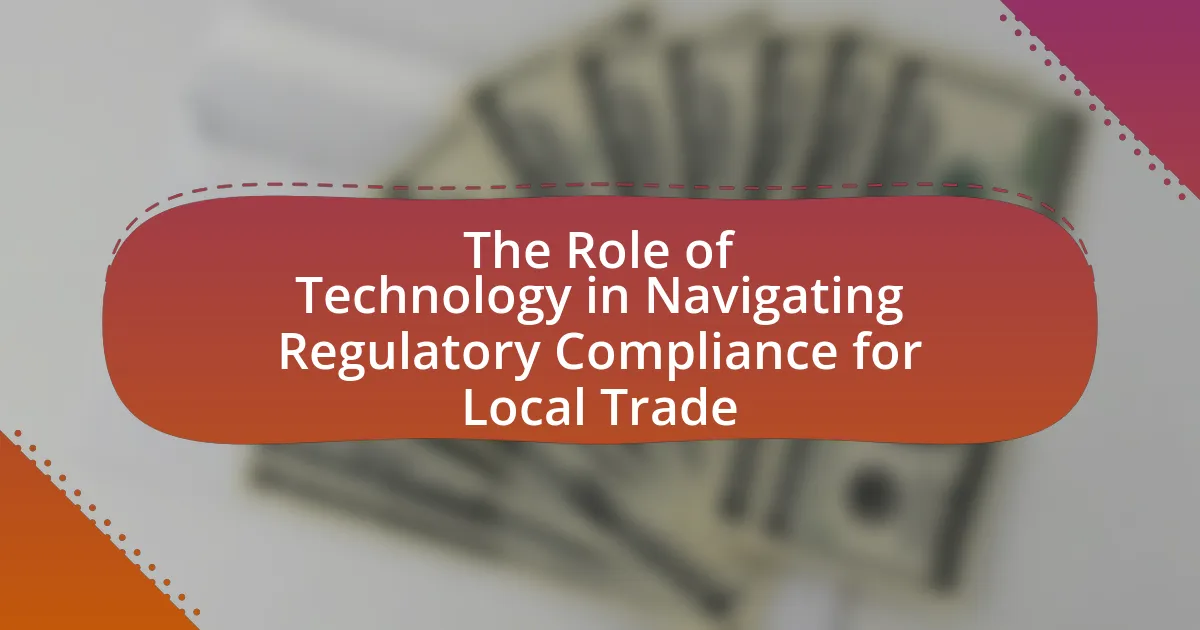Local businesses are increasingly challenged by changing trade regulations, which impact compliance costs, market access, and supply chain stability. This article outlines the key challenges faced by local businesses, including the financial burdens of compliance and the risks of non-compliance, such as legal penalties and reputational damage. It also discusses specific regulations that pose difficulties, strategies for adaptation, and the importance of employee training and technology in ensuring compliance. By implementing proactive measures and fostering a culture of adaptability, local businesses can navigate the complexities of trade regulations and maintain competitiveness in a dynamic market environment.

What are the key challenges local businesses face due to changing trade regulations?
Local businesses face several key challenges due to changing trade regulations, including compliance costs, market access restrictions, and supply chain disruptions. Compliance costs arise as businesses must invest in legal and administrative resources to adhere to new regulations, which can strain financial resources. Market access restrictions can limit local businesses’ ability to export goods or import necessary materials, impacting their competitiveness. Additionally, supply chain disruptions occur when changes in trade policies affect the availability and cost of raw materials, leading to delays and increased operational costs. These challenges are critical as they can hinder growth and sustainability for local businesses in a dynamic trade environment.
How do trade regulations impact local businesses?
Trade regulations significantly impact local businesses by influencing their operational costs, market access, and competitive landscape. For instance, tariffs imposed on imported goods can increase the prices of raw materials, leading to higher production costs for local manufacturers. According to a report by the U.S. International Trade Commission, a 25% tariff on steel resulted in an estimated loss of 400,000 jobs in related industries, demonstrating how trade regulations can directly affect local employment and economic stability. Furthermore, compliance with trade regulations can require local businesses to invest in legal and administrative resources, diverting funds from growth initiatives. Thus, the interplay between trade regulations and local businesses is critical, as it shapes their ability to thrive in a competitive market.
What specific regulations are most challenging for local businesses?
Local businesses often find compliance with labor regulations, tax codes, and environmental laws to be the most challenging. Labor regulations, such as minimum wage laws and employee benefits requirements, can impose significant financial burdens and administrative complexities. Tax codes, particularly those involving sales tax and business income tax, require meticulous record-keeping and can vary widely by jurisdiction, complicating compliance efforts. Environmental laws, including waste disposal and emissions standards, often necessitate costly investments in sustainable practices and technologies. These regulations collectively create a challenging landscape for local businesses, impacting their operational efficiency and profitability.
How do these regulations affect operational costs?
Regulations significantly increase operational costs for businesses by imposing compliance expenses, such as fees for permits, audits, and reporting requirements. For instance, the implementation of environmental regulations often necessitates investments in cleaner technologies and processes, which can lead to higher initial capital expenditures. According to a study by the National Association of Manufacturers, regulatory compliance costs can account for up to 10% of total production costs in certain industries. This financial burden can strain local businesses, particularly small enterprises, as they may lack the resources to absorb these additional expenses effectively.
Why is it important for local businesses to adapt to these changes?
It is important for local businesses to adapt to changing trade regulations to remain competitive and compliant. Adapting ensures that businesses can navigate new legal requirements, which helps avoid penalties and fosters trust with customers and partners. For instance, according to a report by the Small Business Administration, businesses that proactively adjust to regulatory changes are 30% more likely to succeed in their markets. This adaptability not only protects their operations but also enhances their reputation and customer loyalty in an evolving economic landscape.
What are the risks of non-compliance with trade regulations?
Non-compliance with trade regulations poses significant risks, including legal penalties, financial losses, and reputational damage. Legal penalties can manifest as fines, sanctions, or even criminal charges against individuals or companies, as seen in cases where businesses violated the Foreign Corrupt Practices Act, resulting in fines exceeding millions of dollars. Financial losses may arise from disrupted operations, increased costs due to tariffs, or loss of market access, which can severely impact profitability. Additionally, reputational damage can lead to a loss of customer trust and diminished brand value, as evidenced by companies facing public backlash for non-compliance issues. These risks underscore the importance of adhering to trade regulations for sustainable business operations.
How can adaptation lead to competitive advantages?
Adaptation can lead to competitive advantages by enabling businesses to respond effectively to changing market conditions and regulations. When local businesses adjust their strategies, products, or services to align with new trade regulations, they can better meet customer needs and comply with legal requirements, thereby reducing risks and enhancing operational efficiency. For instance, companies that swiftly adapt to environmental regulations may not only avoid penalties but also attract environmentally conscious consumers, leading to increased market share. Research indicates that firms that embrace adaptive strategies can outperform their competitors by up to 30% in rapidly changing industries, demonstrating the tangible benefits of adaptation in securing a competitive edge.

What strategies can local businesses implement to adapt to changing trade regulations?
Local businesses can implement several strategies to adapt to changing trade regulations, including staying informed about regulatory changes, diversifying supply chains, and enhancing compliance training. Staying informed allows businesses to anticipate changes and adjust their operations accordingly, as regulations can shift rapidly due to political or economic factors. Diversifying supply chains mitigates risks associated with reliance on a single source, ensuring that businesses can continue operations even if one supplier is affected by new regulations. Enhancing compliance training equips employees with the knowledge to navigate complex regulations, reducing the likelihood of costly violations. These strategies are essential for maintaining competitiveness and operational stability in a dynamic regulatory environment.
How can local businesses stay informed about regulatory changes?
Local businesses can stay informed about regulatory changes by subscribing to industry newsletters and government updates. These resources provide timely information on new laws and regulations that affect their operations. For instance, the Small Business Administration (SBA) and local chambers of commerce often distribute newsletters that highlight relevant changes. Additionally, attending workshops and seminars hosted by regulatory agencies can offer insights into upcoming regulations and compliance requirements. Engaging with professional associations also allows businesses to network and share information about regulatory developments.
What resources are available for tracking trade regulations?
The primary resources available for tracking trade regulations include government websites, trade associations, and legal databases. Government websites, such as the U.S. Customs and Border Protection and the World Trade Organization, provide official updates on trade policies and regulations. Trade associations, like the National Association of Manufacturers, offer insights and resources tailored to specific industries. Legal databases, such as LexisNexis and Westlaw, contain comprehensive legal information, including trade regulations and case law. These resources are essential for businesses to stay informed and compliant with evolving trade regulations.
How can networking with industry peers help in understanding regulations?
Networking with industry peers enhances understanding of regulations by facilitating the exchange of insights and experiences related to compliance. Engaging with others in the same field allows businesses to share best practices, discuss challenges, and gain clarity on complex regulatory frameworks. For instance, industry associations often host events where members can learn about recent regulatory changes and their implications, providing a platform for collective knowledge that can lead to better compliance strategies. This collaborative approach not only fosters a deeper understanding of regulations but also helps businesses stay informed about upcoming changes that may affect their operations.
What proactive measures can businesses take to ensure compliance?
Businesses can ensure compliance by implementing comprehensive compliance programs that include regular training, audits, and updates to policies. These programs help employees understand regulatory requirements and the importance of adherence. For instance, a study by the Ethics and Compliance Initiative found that organizations with effective compliance training programs experience 50% fewer compliance violations. Additionally, businesses should establish a designated compliance officer to oversee adherence to regulations and facilitate communication regarding compliance issues. Regularly reviewing and updating compliance policies in response to changing regulations further strengthens a business’s ability to remain compliant.
How can businesses develop a compliance strategy?
Businesses can develop a compliance strategy by conducting a thorough assessment of applicable laws and regulations relevant to their industry. This involves identifying specific legal requirements, such as labor laws, environmental regulations, and data protection standards, that impact operations. For instance, a study by the Compliance and Ethics Institute indicates that organizations with a structured compliance program are 50% less likely to face regulatory penalties. Following the assessment, businesses should implement training programs for employees to ensure understanding and adherence to compliance requirements. Regular audits and updates to the compliance strategy are essential to adapt to evolving regulations and maintain effectiveness.
What role does employee training play in compliance?
Employee training plays a critical role in compliance by ensuring that employees understand and adhere to relevant laws, regulations, and company policies. Effective training programs equip employees with the knowledge and skills necessary to recognize compliance issues and respond appropriately, thereby reducing the risk of violations. For instance, a study by the Ethics & Compliance Initiative found that organizations with comprehensive training programs experience 50% fewer compliance violations compared to those without such training. This demonstrates that well-structured employee training not only fosters a culture of compliance but also mitigates potential legal and financial repercussions for businesses.

What are the best practices for local businesses to successfully navigate trade regulations?
Local businesses can successfully navigate trade regulations by staying informed, maintaining compliance, and engaging with regulatory bodies. Staying informed involves regularly reviewing updates from government agencies and industry associations, which helps businesses understand changes in trade laws and regulations. Maintaining compliance requires implementing robust internal processes, such as regular audits and employee training, to ensure adherence to legal requirements. Engaging with regulatory bodies allows businesses to seek clarification on regulations and participate in discussions that may influence future policies. According to the U.S. Small Business Administration, businesses that actively engage with regulatory agencies are better positioned to adapt to changes and mitigate risks associated with non-compliance.
How can local businesses leverage technology for compliance?
Local businesses can leverage technology for compliance by utilizing software solutions that automate regulatory reporting and monitoring. These tools help businesses track changes in regulations, manage documentation, and ensure adherence to legal requirements efficiently. For instance, compliance management systems can provide real-time updates on regulatory changes, reducing the risk of non-compliance. According to a study by the Compliance, Governance and Oversight Council, organizations that implement technology for compliance see a 30% reduction in compliance-related costs. This demonstrates that technology not only streamlines compliance processes but also enhances overall operational efficiency.
What software solutions are available for managing compliance?
Software solutions available for managing compliance include tools like GRC (Governance, Risk, and Compliance) platforms, compliance management software, and regulatory tracking systems. These solutions help organizations streamline compliance processes, monitor regulatory changes, and ensure adherence to laws and standards. For instance, software such as LogicManager and RSA Archer provides integrated risk management features that assist businesses in identifying compliance gaps and automating reporting. Additionally, tools like ComplyAdvantage and MetricStream offer real-time monitoring of regulatory updates, which is crucial for local businesses adapting to changing trade regulations.
How can data analytics improve regulatory compliance efforts?
Data analytics can significantly enhance regulatory compliance efforts by enabling organizations to monitor, analyze, and report on compliance-related data in real-time. By leveraging advanced analytics tools, businesses can identify patterns and anomalies in their operations that may indicate compliance risks, allowing for proactive measures to be taken. For instance, a study by Deloitte found that companies utilizing data analytics for compliance saw a 30% reduction in compliance-related incidents, demonstrating the effectiveness of data-driven insights in mitigating risks. Furthermore, data analytics facilitates streamlined reporting processes, ensuring that organizations can meet regulatory requirements efficiently and accurately, thus reducing the likelihood of penalties and enhancing overall compliance posture.
What tips can local businesses follow to enhance their adaptability?
Local businesses can enhance their adaptability by implementing flexible operational strategies, such as diversifying their product offerings and adopting technology for remote work. Diversification allows businesses to mitigate risks associated with market fluctuations, as evidenced by a study from the Harvard Business Review, which found that companies with diverse product lines are better positioned to withstand economic downturns. Additionally, leveraging technology for remote work can improve efficiency and responsiveness to changing market conditions, as shown by a report from McKinsey, which indicated that businesses that adopted digital tools during the pandemic were more resilient. By focusing on these strategies, local businesses can better navigate the complexities of changing trade regulations.
How can businesses create a culture of compliance and adaptability?
Businesses can create a culture of compliance and adaptability by implementing comprehensive training programs that emphasize the importance of regulatory adherence and flexibility in operations. These training programs should be designed to educate employees about current regulations and the implications of non-compliance, fostering a shared understanding of the organization’s commitment to ethical practices.
Additionally, establishing clear communication channels for reporting compliance issues and encouraging feedback can enhance adaptability. For instance, organizations that actively solicit employee input on regulatory changes and operational challenges are better positioned to adjust their strategies effectively. Research indicates that companies with strong compliance cultures experience 50% fewer regulatory violations, demonstrating the tangible benefits of such initiatives.
Moreover, integrating compliance into the core values of the organization and recognizing employees who exemplify these values can reinforce the desired culture. By aligning compliance with business objectives, organizations can ensure that adaptability becomes a fundamental aspect of their operational framework.
What are common pitfalls to avoid when adapting to trade regulations?
Common pitfalls to avoid when adapting to trade regulations include failing to stay informed about regulatory changes, neglecting to conduct thorough compliance assessments, and underestimating the importance of employee training. Staying updated on regulations is crucial, as trade laws can change frequently, impacting business operations. Conducting compliance assessments helps identify gaps in adherence to regulations, which can prevent costly penalties. Additionally, training employees ensures that they understand the regulations and can implement necessary changes effectively, reducing the risk of non-compliance.




